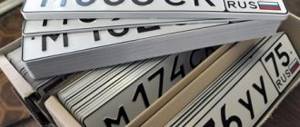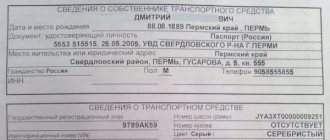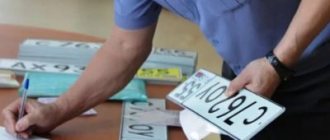Is it possible to register a car after deregistration?
There is no clear answer to the question of whether it is possible to register a car after deregistration. Problems should not arise when the documents for the car are in order and the purchase and sale agreement is drawn up correctly. A vehicle without any encumbrances or prohibitions , as well as with the original VIN code, is considered legally clean. It is best if the purchase and sale is carried out in a commission company (for example, a car dealership), where the documents are professionally checked.
It will not be possible to register a car (at least without legal proceedings) if the registration is terminated by the State Traffic Safety Inspectorate for compelling reasons related to the imposition of prohibitions and violation of the laws of the Russian Federation. A scrapped vehicle is not subject to registration.
Difficulties may arise when technical changes are made that are not specified in the PTS. If major changes (for example, installing a more powerful engine) are not approved by the traffic police, then the car will have to be returned to its factory appearance.
Why do they sell deregistered cars?
Handing over money and keys
You may be concerned about why the former owner deregistered the car and what does this mean for you if you decide to buy it? For example, you must be sure of the possibility of registering your car by registering with the Russian State Traffic Safety Inspectorate. If the car is no longer registered and without license plates, you will have to go through the process of restoring registration, but can you do this by buying a car on the secondary market?
As was said, since 2013, Russians have the opportunity to resell cars without deregistration, since this happens automatically when the vehicle is re-registered by the new owner.
It is now impossible to terminate the registration of a car before it is sold by alienation (ownership rights are transferred to another person). The former owner has the right to deregister the car with the traffic police only ten days after drawing up the purchase and sale agreement, if the buyer does not register the car within this allotted period.
In 2021, selling a deregistered car is a little more difficult than selling a vehicle that is already registered. The fact is that, in addition to the risks associated with the bad history of the car, the buyer will not have confidence in the possibility of restoring registration under the new rules without involving the previous owner.
Buying a car that is not registered should make you wonder why the owner took the plates off his car? There may be several reasons, but the most common are the following:
- Vehicle disposal.
- Removing the car outside the country.
If the vehicle was not disposed of in time, you can legally register it again. Thus, you should not be afraid to buy a deregistered car. In addition, you can restore registration under a purchase and sale agreement yourself, without contacting the previous owner.
Regardless of the fact that a new car owner will not have problems registering a purchased vehicle that has been deregistered, it is better to play it safe to avoid troubles. You can ask the seller to register the car or agree on the transfer of funds only after you register the vehicle in your name. In this case, you will have complete confidence that no problems will arise.
What to do if the old owner stopped registering?
The car seller can officially deregister the vehicle before the sale and purchase procedure is completed. This option is considered one of the most reliable, because... The traffic police checks for prohibitions and violations. Modern rules do not require such action on the part of the previous owner, because After the transaction is completed and the car is registered by the new owner, deregistration is ensured automatically. The previous owner cannot remove the product from him until the expiration of 10 days after the sale.
When buying a car, it is important to understand why the seller stopped registering it in advance. The following difficult situations are possible:
- The car was resold several times. The last owner did not register it, and it was deregistered before him. In this case, the car was listed as the last bona fide owner. To confirm the right to own such a vehicle, you will have to provide the traffic police with all purchase and sale agreements executed during the resale process. In this case, you will definitely need a document drawn up before the date of the last registration of the car.
- The vehicle was in collateral. Registering it won't cause any problems, but the new owner should be aware that the collateral remains with the bank, and the lender has the right to repossess the car. Such a risk is difficult to avoid, because... the loan could be issued in any region, but it is necessary to carry out a check.
- The car was taken into account due to disposal after an accident or failure due to the end of its service life. You cannot buy such a car, because... it will not be possible to register it.
In order to avoid getting into a difficult situation, the buyer should take precautions. If there are any suspicions, you can negotiate the final payment after the new registration of the car, which reduces risks to a minimum. Before purchasing, you need to check the vehicle for any encumbrances in the traffic police database, as well as your credit history. It is imperative to check the compliance of the license plate details and appearance of the vehicle with the PTS data.
What you need to know if you don’t know how to transport a car without documents
For those who are thinking about how to move a car without documents, it is worth knowing that in article 12.3. it is said that if the driver does not have documents confirming the right to own the car, as well as control this mechanical vehicle, then this will entail a fine. The same condition applies if the car is transported on a tow truck or car transporter without any accompanying documents.
If the documents were lost, you can recommend to the owner to first declare the loss of the documents and restore them, or obtain a certificate of loss or permission to transport both independently and for transportation. The same applies to the question of how to overtake a car that has been deregistered.
In addition, if the car has already been registered once, then you have received your card at the MREO and in case of loss of documents, after the owner applies, you can get a duplicate. The exception is when the car is deregistered and written off as scrap. In this case, it will be impossible to restore the documents. The exception is going to court. Usually, the traffic police can consider all cars that do not have documents as stolen, and therefore you should be careful.
But more often than not, donor cars transported for disassembly do not attract much attention, especially if they have the appropriate appearance. And in this case, the question of how to move a car that has been deregistered is practically not worth it, since it is important to receive documents stating that it is just scrap metal.
You may also encounter a situation when the question arises of how to move a car without a technical inspection. In this case, if you have a document confirming ownership, indicating the date of purchase, you can move for some time without undergoing a technical inspection, including transfer to the new owner.
Registration process
The procedure for registering a vehicle is regulated by Order of the Ministry of Internal Affairs dated November 24, 2008 No. 1001, as amended in accordance with Order of the Ministry of Internal Affairs dated August 7, 2013 No. 605.
Where should I go?
To register a purchased car, the new owner must contact the MREO traffic police department. Currently, there is no need to be tied to the place of registration, and the application can be submitted in any region. Often this place becomes the nearest territorial traffic police department in the city where the purchase was made. It should be remembered that without a new registration, a car deregistered cannot be used, and driving it is punishable by a fine. Even to the station for technical inspection and to the traffic police, it will have to be delivered by tow truck.
What documents will be needed?
To register a used vehicle, the following documents are required:
- application for vehicle registration;
- ID card (passport);
- purchase and sale agreement or other document confirming ownership;
- documents for the car (primarily the title);
- OSAGO policy;
- documents for payment of state duty;
- a document determining the technical condition of the car (technical inspection).
Additionally, a medical examination document of the applicant may be required. The application must indicate the desire to register a vehicle that was previously deregistered.
Conduct an inspection at the traffic police department
Before applying for registration, the car must pass a technical inspection. To receive a diagnostic card about its serviceability, it is sent to a service station, where a sales contract is presented. With this document, the car is transported to the traffic police inspection platform, where license plates and body parts are checked, as well as the presence of significant design changes not reflected in the title. A note is made on the application that this inspection has been completed, after which it can be submitted to the appropriate window of the MREO.
What are the deadlines for registering a car?
The new owner is required to register the car within 10 days. Otherwise, delay will be considered an administrative offense and punishable by a fine. The time of the registration procedure itself is also regulated by Order No. 605. It should not exceed 60 minutes. The exception is when additional information is required or a discrepancy is identified with the stated data.
State duty amounts
When registering a technical device, the applicant bears the following costs:
- New license plates - 2000 rubles.
- The state fee for registration and issuance of a certificate is 500 rubles.
- Making changes to the PTS – 350 rubles.
Total costs reach 2850 rubles. When issuing a new PTS, an amount of 500 rubles is paid, which increases the total costs to 3,000 rubles.
Is it possible and how to deregister a car without the car itself and without documents?
Deregister a car without a car
Termination of registration of a car is carried out on the basis of a certain set of documents, and in some cases this requires the vehicle itself and its license plates. The specific set of required papers depends on the basis for this procedure, and there may be several of them. In the article we find out whether it is possible to deregister a car from the traffic police without presenting the car for inspection, how to do this, and also what to do if there are no documents for the car, including a purchase and sale agreement, PTS and STS.
What may be required to restore accounting?
In certain circumstances, the traffic police may terminate registration. To restore accounting, the following actions may be required:
- loss of performance due to technical reasons (most often after an accident). To restore registration, it is necessary to ensure a complete repair, and then undergo a technical inspection at a service station and receive a technical serviceability certificate;
- car theft. This fact is established based on the victim’s statement. If the car is found and returned to the owner, then re-registration will not cause problems;
- delay in the allotted period for registering the car (10 days). A forgetful car owner will have to submit an application indicating the reasons for the delay. If they are disrespectful, they will have to pay a fine. After this, registration proceeds as usual. It should be remembered that malicious evasion of registration may be punishable by deprivation of rights;
- expiration of the temporary registration period. An application is submitted to extend the temporary registration permit. When selling an imported car, a sales contract is presented, on the basis of which an application for registration is completed in the usual manner;
- upon completion of leasing and redemption in accordance with the agreement, an application is submitted and documents confirming ownership rights are provided.
If the previous owner deregistered the car, but the documents are in perfect order, then restoring the registration does not cause any problems. All data is in an electronic database, and it will not take much time to verify the information.
How to check: reseller or owner?
There are several relatively simple ways to identify resellers.
- When making the initial call, quickly ask for the brand of car that is on sale. If the seller hesitates or asks what specific car you have in mind, then he is a reseller, because he most likely has at least several cars in his “park”.
- Ask for the seller's name over the phone. If it does not match what is indicated in the ad, then the seller is not the owner of the car.
- Ask about the name of the person to whom the vehicle is registered. If it does not match the name of the person indicated in the ad, then the seller is most likely a reseller. But outbidding is unlikely to answer this question for you at all.
- Check the phone number against databases available on the Internet.
- Check the phone number for multiple advertisements. This can be done in most aggregators: Auto, Auto.ru and others.
For what reason can the traffic police refuse registration?
The traffic police has a legal basis to refuse registration of a vehicle for the following reasons:
- The car is listed as stolen or wanted as a participant in a crime. Problems may arise after it has been found and returned to the owner. If the owner has not restored the registration of the car and sold it, the traffic police will refuse to register it as the new owner. Restoration of accounting must be carried out by the previous owner.
- Disposal of the machine. If a car is deregistered due to scrapping, then selling it as a vehicle is illegal. It will not be possible to register it.
- Making major changes to the design without approval. During inspection, all license plates must be checked against the vehicle title. If a discrepancy is detected, then refusal of registration is natural. The previous owner must make the appropriate changes to the title, and only after that sell. Otherwise the factory registration must be returned. You can also get a refusal if your windows are tinted excessively. In this case, you will have to urgently remove it.
- Recognition of the car as “total” by the insurer. There are cases when, in an accident, a car is so damaged that the insurer considers repairs to be unprofitable and pays the full amount of insurance. He sends the relevant information to the traffic police, and the car is deregistered. It must be scrapped and cannot be registered again.
- The car is intended for export outside the country for sale.
The registration of a car may be suspended if there are compelling reasons to consider the sale or gift transaction to be illegal. In this case, there is a system of prohibitions and burdens on the purchase and sale procedure. Registration will continue after confirmation of ownership by the court or the lifting of the relevant ban.
| Did not find an answer to your question? Call a lawyer! Moscow: +7 (499) 110-89-42 St. Petersburg: +7 (812) 385-56-34 Russia: +7 (499) 755-96-84 |
Registering a car with the traffic police after its registration has been terminated is not difficult if you have the necessary documents for the vehicle, there are no prohibitions, the reasons for deregistration have been eliminated and a legal purchase and sale transaction has been carried out. In some cases, registration may be refused on completely legal grounds. It should be remembered: dubious transactions can lead to the fact that using the purchased car becomes impossible. Sometimes a missed opportunity is better than a thoughtless loss of a lot of money.
The car is not being sold by the owner - is it possible to buy it and what are the risks?
Most trading platforms specializing in the sale of used cars provide exclusive conditions for resellers. It is the latter who have the opportunity to be the first to see all offers from sellers that are in pre-moderation and buy the most relevant options without unnecessary competition. Therefore, the used car market is overflowing with offers from resellers and many buyers have to deal with them in one way or another.
There are two schemes for the work of such people.
- Purchasing a car from the seller, full registration of the contract between the parties and entering the name in the title. In this case, the car is not registered with the traffic police.
- Filling out the DCT form without the signature of the outbidder. In this case, the subsequent buyer will be forced to enter into a transaction with a third party, and not directly with the reseller.
Advantages and disadvantages of the first scheme
If the reseller purchased the vehicle and entered his name on the title, then he actually became the new owner. Therefore, during further resale, the next buyer will have nothing to worry about (except, perhaps, for the necessary checks to ensure that the car is clean from prohibitions and deposits), because he will be dealing with the owner.
The presence or absence of registration of a car with the traffic police in this case does not play a significant role. The buyer only needs to check the entire chain of contracts, sign the contract and make sure that after purchasing the car, the name will be entered in the title.
Pros and cons of the second scheme
If the reseller does not sign the contract, then such a transaction for a potential buyer has the following advantages:
- the absence of extra names in the title, which has a positive effect on the likelihood of further sale of the vehicle;
- ease of re-registration of the vehicle in the traffic police.
But the disadvantages of such a scheme for the end buyer can play a fatal role:
- the real previous owner (who sold it to a reseller) removed the car from the traffic police register (we will discuss this subtlety a little lower, and this is the most important pitfall of buying a car from someone other than the owner),
- lack of information about the real owner;
- inability to make changes to the policy;
- inability to contact the owner if the car is wanted;
- impossibility of finding out the original cost of the car.
In other words, such a scheme is beneficial exclusively to the reseller, since when the car is sold, it ceases to appear in the DCP and, if troubles arise, it remains, in general, out of business.









